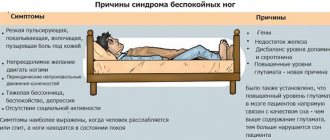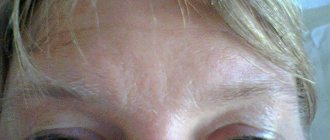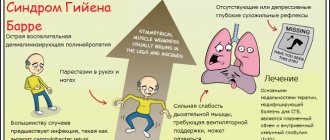Asthenia (or asthenic syndrome) is a condition characterized by constant weakness and increased fatigue. With this syndrome, the patient is constantly in a state of nervous tension: this is manifested by irritability, tearfulness, and in severe cases, apathy to everything that happens around may even occur.
A prolonged stay in a state of asthenia is fraught with extreme emotional exhaustion of the body , disturbances in the transmission of nerve impulses and other, more serious problems. Asthenic syndrome is especially dangerous for children, as it can have a direct impact on the child’s health and development.
Risk factors
The etiology of astheno-neurotic syndrome (ANS) exists both from birth and can be acquired during life.
With a congenital disease, it may manifest itself up to three or four years of age. Neurologists point out that temperament plays an important role in the development and overcoming of the disease. These include: choleric, sanguine, phlegmatic, melancholic. Those with a melancholic temperament are most prone to a disorder of this nature.
Another fact is the genetic predisposition to the development of ANS in children. There is a high probability that neurotic psychosis occurred in the lives of the patient’s parents at some point in their lives.
In this case, the child should be observed by a neurologist; some treatment or adjustment of the condition may be required, and the rehabilitation period may take a longer time.
Acquired ANS can appear as a result of previous injuries to the cervical vertebrae with constant excitement, anxiety and after sufficient stress.
Whatever the illness, children will definitely need psychological help. In addition to them, parents also need consultations so that they can correctly develop the ability to communicate with their child and develop proper relationships.
For a doctor, in establishing a prognosis for a patient, the degree of disorder of nervous functions plays an important role. With an uncomplicated disease, the prognosis will generally be favorable.
Typically, children are prescribed rehabilitation measures in periodic courses, alternating them every few months. And the beneficial effect of the treatment method and prognosis strongly depend on how the parents feel about the baby’s condition and their psychological stability.
General characteristics of the disease
Asthenic neurosis (neurasthenia, nervous weakness) is a disorder of a neuropsychogenic nature, which is caused by physical or psycho-emotional exhaustion.
This is the most common pathology of the nervous system.
Persons of the asthenic type, who are emotionally unstable, easily tired, and hypersensitive, are more susceptible to this disorder.
- In women, asthenic neurosis is much less common than in men.
- The condition manifests itself in increased fatigue, irritability, decreased mood up to depression, and inadequate sensitivity to various kinds of stimuli (noise, light, temperature).
- The development of such a condition can be facilitated not only by physical or psychological stress, but also by chronic diseases, as well as intoxication of the body.
- Nerve weakness can develop in both adults and children.
Children have a fragile body, as well as a weak nervous system, for this reason it is important to protect them from overwork. Considering the fact that modern children have to study a lot and keep up with everything, chronic fatigue can often occur. Parents may notice that the child begins to get tired faster, remembers information worse, and his performance has also decreased.
At the same time, it is in childhood that the cause of asthenia can be added, such as frequent infectious diseases that a minor will begin to suffer from.
The baby’s immunity will begin to constantly decrease, and because of this, his overall health will deteriorate. This happens because the child experiences significant nervous tension and also suffers from high anxiety. That is why parents should take care not only of the child’s emotional well-being, but also of their physical health.
If a child experiences an asthenic state, then he will feel weak, depressed and overwhelmed. Persistent apathy may arise, due to which he will show indifference to the world around him. Often there are difficulties with falling asleep, the sleep-wake pattern is significantly disrupted, which only makes the situation worse. If a minor cannot get enough sleep, then this significantly affects his health.
Most often, asthenia is diagnosed in children of primary school age. This can be explained by the fact that the daily schedule and activities change significantly, and the workload in the educational institution increases significantly. They begin to demand more from the child, but he has never encountered anything like this before. As a result, he may experience significant nervous tension.
When attending school, a child must not only limit his movements during class, but also activate mental activity to memorize the material. Moreover, the break is too short to allow for proper rest. Moreover, you have to do tasks at home, which is why you also cannot restore your strength.
Causes of nervous disorder
Doctors are convinced that the initial cause is heredity: the child adopts certain features of the parent’s central nervous system, especially the tendency to increased excitability of neurocytes, which are responsible for establishing connections between brain cells. Choleric and melancholic people are most predisposed to various diseases of the neurological spectrum.
In addition to genetics and temperament, there are a number of other reasons that provoke the occurrence of astheno-neurotic syndrome in children:
- dysfunctional environment, troubles at home, excessive strictness of parents in upbringing, high demands, change of team and problems in relationships with peers;
- deficiency of vitamins and minerals - the central nervous system reacts sharply to a lack of B vitamins;
- dysfunction of the hormonal and endocrine systems, in which there is an excess of hormones that provoke dysfunction of the cerebral cortex or its individual parts;
- chronic diseases of the main filters - kidneys and liver, increased levels of breakdown products in the body affect the condition and functionality of the central nervous system;
- the complex course of pregnancy globally affects the state of the fetal central nervous system - severe toxicosis, Rh conflict, drug intoxication, intrauterine infection, severe infectious diseases at the beginning and end of gestation;
- a woman’s lifestyle during pregnancy, nervous exhaustion, uncontrolled use of medications, drug use, smoking, alcohol;
- hypoxia – oxygen starvation of brain cells due to birth injuries, etc.;
- poisoning by toxins due to self-medication and ignoring age-related doses of medications;
- injuries to the neck, cranial vault, concussion, even one that was received a long time ago, often leads to brain dysfunction and malfunction of certain areas of the brain;
- viral and bacterial infections of the membranes, cortex and the brain itself - meningitis, encephalitis, arachnoiditis;
- prolonged stress, increased load on the central nervous system.
Asthenic neurosis or neurasthenia is the most common disorder of the nervous system in children and adolescents. This is the main reason for the decline in academic performance among schoolchildren and the deterioration of relationships with the older generation and peers.
Among the variety of preconditions for the disorder, the social and accompanying psychological factors are often at the forefront.
Moral overload, which was preceded by failures of social adaptation and everyday troubles, can quite easily provoke a crisis of the asthenic type.
Possible options due to which astheno-neurotic malaise appears:
- heavy load on the nervous system;
- frequent stress;
- metabolic dysfunction in the human brain;
- previous neck and brain injuries;
- thyroid diseases;
- hereditary factor;
- problems of the central nervous system.
These symptoms are especially strong for people with very weak psyches. The desire for promotion and success in one’s career also risks causing damage to mental functions if a given person often neglects himself in proper rest and constantly lacks sleep.
The same thing happens with children: to be the first student in the class, to pass the GTO standards best of all, to win the city Olympiad, and so on.
Symptoms of AS in infants
If a newborn does not have organic brain damage or any other serious underlying causes, doctors consider infant asthenia as a hereditary factor. One of the most obvious symptoms of asthenic syndrome in infants is sleep disturbances. A child may cry for hours and have great difficulty falling asleep. Long periods of lying down, rocking in arms or in a stroller only aggravate the situation. In such cases, you just need to put the baby in bed and leave the room.
The rest of the symptoms are as follows:
- During feeding, the child takes a few sips and refuses to eat. One gets the impression that he does not even have the strength to take a pacifier and make swallowing movements. At the same time, he does not fall asleep, but cries and moans.
- Despite the correct dosed feeding (or even with overfeeding), he does not gain weight.
- The umbilical cord is bleeding.
- Spontaneous twitching and movements of the limbs occur.
- Mucus accumulates in the mouth, which the child does not even spit out by coughing.
- Suffering from regular constipation. The child is so weak that he does not even have the strength to pass feces.
- Jaundiced complexion.
- The general condition systematically worsens from the second half of the day until 20-00, as well as towards midnight.
- The child cries for a long time and for no reason.
- Reacts fearfully to any sounds.
It is unacceptable to relieve the symptoms of asthenia in infancy with medications. Therefore, all that can be used as therapeutic therapy at this stage is gymnastics in water, massage of all muscle groups and a well-organized daily routine.
How to treat astheno-neurotic syndrome in children
First of all, the victim needs to be provided with good psychological support. At the same time, take medications prescribed by a specialist, which will help eliminate most of the symptoms.
A relaxing effect comes from taking a bath using various spicy oils that will help tone the body.
Treatment therapy is divided into three stages. For the initial stages of the disease, it is possible to prescribe a special regime of work and rest. Perhaps the doctor will recommend walking more in the fresh air, spending less time at the computer or tablet.
If the situation drags on, treatment requires the help of a psychologist. In case of severe astheno-neurotic syndrome, the child is prescribed medication.
The following medications can be used at the discretion of the doctor: antidepressants, sedatives, relaxants, sedatives.
But taking them for a long time is not recommended. During treatment, medical supervision is necessary.
Treatment of ANS requires an integrated approach. In addition to medications and baths, it is recommended to perform sports warm-ups more often, follow the recommended diet, and in some cases, drug therapy is prescribed.
It is much easier to cope with symptoms that appear in the initial stages than to treat an advanced condition. This type of disease is dangerous because it damages the nervous system and affects moral and physical development. With a poor approach to identification and treatment, the baby becomes withdrawn and poorly perceives the world around him.
Drug treatment
Medicines belonging to the group of adaptogenic substances are prescribed as means that increase energy reserves and replenish strength. Vitamins and mineral complexes are used to restore and strengthen the child’s immune system.
For increased irritability, sedatives are indicated. During attacks of acute psychosis, various types of antipsychotics may be prescribed. To increase brain activity, drugs belonging to the group of nootropic drugs are used.
In severe and advanced conditions, antidepressants and tranquilizers are prescribed.
It is prohibited to prescribe medications to your child yourself. To make a diagnosis and prescribe therapy, you must contact an appropriate specialist.
Psychological characteristics of children with ANS, rehabilitation
Babies suffering from ANS usually show nervousness and aggression. They can be immediately recognized by their behavior among other children. Usually they are quite conflicting, they can offend others and talk with everyone on high notes.
Other manifestations of psychosis include frequent crying, emotions and screams, and objections to usual simple everyday actions. They may cry constantly, have a very poor appetite, refusal of their favorite foods, and sudden manifestations of hysteria in the garden and at home.
Preschool institutions usually do not keep track of these children, but send them to classes with psychologists. If parents properly comply with the actions prescribed by the neurologist and psychologist, and pay due attention, then an integrated approach to solving the problem gives a positive result.
When carrying out rehabilitation, it is advisable to take into account the duration of treatment, which is more than one month. The process is very long and if the outcome is successful, it still requires long-term care and exercise. Necessary activities include visits to a psychologist, involving young patients in swimming, embroidery, and the use of herbal medicine.
The main thing in carrying out restoration work is to avoid conflicts, nervous outbursts, maintain a favorable daily routine and proper, nutritious nutrition.
Possible forms
The existing classification of asthenic syndrome is based on the reasons that can provoke it:
- fatigue asthenia can be caused by heavy stress on the body without sufficient time for rest and recovery;
- cerebrogenic asthenia can be a consequence of various brain diseases (including possible negative consequences and side effects from treatment);
- somatogenic is explained by diseases of other organs or systems of the body (kidneys, liver, lungs);
- Cerebro-somatogenic, as you might guess, is a “cocktail” of the first two types;
- adaptive (maladaptive) asthenia is the result of deafening emotional shocks or extreme stress that cannot be compensated by maintaining a daily routine or a healthy lifestyle.
What type of asthenic syndrome can be called the least dangerous? The first option (asthenia of overwork) often turns out to be an inevitable price to pay for career growth, but without obvious functional pathology. The second and third forms are associated with certain diseases (kidneys, endocrine glands, heart, etc.), therefore the treatment of such asthenia should primarily be dealt with by specialized specialists, and not elderly neurologists with rubber-steel hammers who remember the methods punitive psychiatry of the mid-20th century. The latter type often overtakes the most ordinary people in the event of the death of close relatives or the collapse of all life plans, but over time the pain dulls, and the person most often finds the strength to live on.
Consequences of ANS, forecasts
If such serious ataxia is neglected and there is no adequate and timely treatment, there is a chance of becoming seriously depressed, and in some cases, desires to end life may appear.
Basically, people during a period of disorder are quite able to get rid of it on their own. But it is very difficult to get out of a complication that has developed into deep depression without the help of a qualified specialist who will conduct an examination and prescribe a comprehensive course of treatment.
Not paying attention to the manifestations of dysphoria in children entails undesirable changes in the endocrine system and possible dysfunction upon reaching puberty. Adults who suffered such disorders in childhood may have certain problems with reproduction.
Diagnostics
Psychotherapists use a range of studies and tests:
- clinical diagnosis - a survey, collection of anamnesis and follow-up, which is carried out by a therapist, neurologist and psychiatrist. Each specialist builds a conversation in such a way as to identify the symptoms of his spectrum. Diagnosis is complex;
- the physical method is carried out by a therapist, its purpose is to examine and evaluate the functioning of the internal organs, followed by an appointment with a neurologist to identify symmetry, reactions to light and sound, analyze the correspondence of reflexes to the patient’s age category, and identify developmental delays;
- psychodiagnostics is carried out by a psychologist, the method is aimed at identifying instability of attention, disorders in long-term and short-term memory, disorders of logical and spatial thinking. Patients with astheno-neurotic syndrome, by the end of the conversation with a psychologist, demonstrate fatigue, exhaustion, their speech is confused, and there is no logical chain in their judgments;
- The instrumental method involves conducting a number of studies (rheoencephalogram, magnetic resonance imaging, X-ray, ultrasound of the head and neck, etc.). Patients with asthenic syndrome have obvious deviations from the norm in the functioning of the vascular system, an imbalance of nerve impulses, pinching or neoplasms in the neck or brain, etc.;
- laboratory tests, the purpose of which, through a general blood test and biochemistry, is to exclude various infections and diseases that can masquerade as mental and nervous disorders.
If symptoms unusual for central nervous system diseases occur, it is recommended to undergo additional tests to exclude the presence of diseases of the hematological, immunological and infectious spectrum.
Tips for parents
You can diligently follow all the treatment prescriptions of a neurologist, choose the right diet for your child, and not miss a single massage session, but still not see the expected result. Asthenic syndrome is a neurosis. All neuroses arise against the background of internal conflict and eternal anxiety in the child. The atmosphere in the family can either contribute to recovery, or quite the opposite: asthenia will only progress if your parenting methods run counter to generally accepted norms.
- Do you want to put an end to manipulative tantrums as soon as possible? Stop making the child the idol of the family.
- Overprotection is that level of care that additionally only irritates. Give your child more freedom of action. Your trust will significantly relieve excess hypertension.
- Rejection of the child, lack of attention is the other extreme. The feeling of uselessness is very depressing.
- Emotional breakdowns in a child and unpredictable behavior of parents create enormous stress.
- A harsh upbringing never did anyone any good. Be gentle.
- Use rewards, reprimands and punishments in reasonable combinations.
- Forget about any intimidation and threats.
- Stop imposing on your child any activity that is not interesting to him (foreign languages, music lessons, ballroom dancing, etc.).
- Limit the use of a computer, tablet or other gadgets to strict time limits.
And the most important advice: do not behave with your child as if he is seriously ill. Don't constantly remind him that he needs treatment. Asthenic syndrome is not a disease, but a temporary condition. And everything will return to normal if you don’t dramatize it or, on the contrary, let the situation take its course, and also follow all reasonable recommendations.










